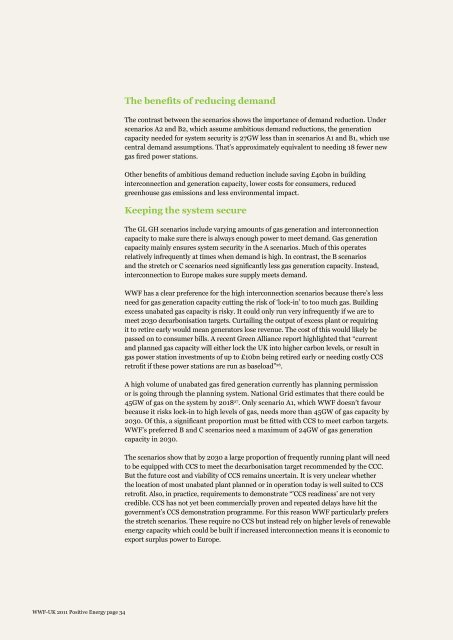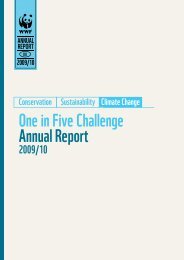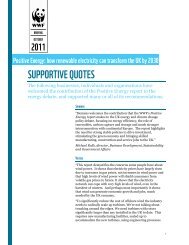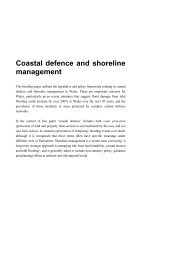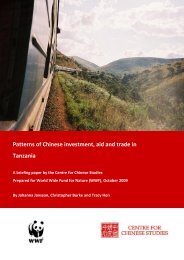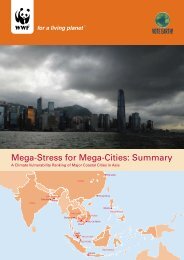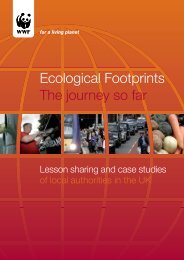Positive Energy: how renewable electricity can transform ... - WWF UK
Positive Energy: how renewable electricity can transform ... - WWF UK
Positive Energy: how renewable electricity can transform ... - WWF UK
You also want an ePaper? Increase the reach of your titles
YUMPU automatically turns print PDFs into web optimized ePapers that Google loves.
The benefits of reducing demand<br />
The contrast between the scenarios s<strong>how</strong>s the importance of demand reduction. Under<br />
scenarios A2 and B2, which assume ambitious demand reductions, the generation<br />
capacity needed for system security is 27GW less than in scenarios A1 and B1, which use<br />
central demand assumptions. That’s approximately equivalent to needing 18 fewer new<br />
gas fired power stations.<br />
Other benefits of ambitious demand reduction include saving £40bn in building<br />
interconnection and generation capacity, lower costs for consumers, reduced<br />
greenhouse gas emissions and less environmental impact.<br />
Keeping the system secure<br />
The GL GH scenarios include varying amounts of gas generation and interconnection<br />
capacity to make sure there is always enough power to meet demand. Gas generation<br />
capacity mainly ensures system security in the A scenarios. Much of this operates<br />
relatively infrequently at times when demand is high. In contrast, the B scenarios<br />
and the stretch or C scenarios need signifi<strong>can</strong>tly less gas generation capacity. Instead,<br />
interconnection to Europe makes sure supply meets demand.<br />
<strong>WWF</strong> has a clear preference for the high interconnection scenarios because there’s less<br />
need for gas generation capacity cutting the risk of ‘lock-in’ to too much gas. Building<br />
excess unabated gas capacity is risky. It could only run very infrequently if we are to<br />
meet 2030 decarbonisation targets. Curtailing the output of excess plant or requiring<br />
it to retire early would mean generators lose revenue. The cost of this would likely be<br />
passed on to consumer bills. A recent Green Alliance report highlighted that “current<br />
and planned gas capacity will either lock the <strong>UK</strong> into higher carbon levels, or result in<br />
gas power station investments of up to £10bn being retired early or needing costly CCS<br />
retrofit if these power stations are run as baseload” 26 .<br />
A high volume of unabated gas fired generation currently has planning permission<br />
or is going through the planning system. National Grid estimates that there could be<br />
45GW of gas on the system by 2018 27 . Only scenario A1, which <strong>WWF</strong> doesn’t favour<br />
because it risks lock-in to high levels of gas, needs more than 45GW of gas capacity by<br />
2030. Of this, a signifi<strong>can</strong>t proportion must be fitted with CCS to meet carbon targets.<br />
<strong>WWF</strong>’s preferred B and C scenarios need a maximum of 24GW of gas generation<br />
capacity in 2030.<br />
The scenarios s<strong>how</strong> that by 2030 a large proportion of frequently running plant will need<br />
to be equipped with CCS to meet the decarbonisation target recommended by the CCC.<br />
But the future cost and viability of CCS remains uncertain. It is very unclear whether<br />
the location of most unabated plant planned or in operation today is well suited to CCS<br />
retrofit. Also, in practice, requirements to demonstrate “’CCS readiness’ are not very<br />
credible. CCS has not yet been commercially proven and repeated delays have hit the<br />
government’s CCS demonstration programme. For this reason <strong>WWF</strong> particularly prefers<br />
the stretch scenarios. These require no CCS but instead rely on higher levels of <strong>renewable</strong><br />
energy capacity which could be built if increased interconnection means it is economic to<br />
export surplus power to Europe.<br />
<strong>WWF</strong>-<strong>UK</strong> 2011 <strong>Positive</strong> <strong>Energy</strong> page 34


